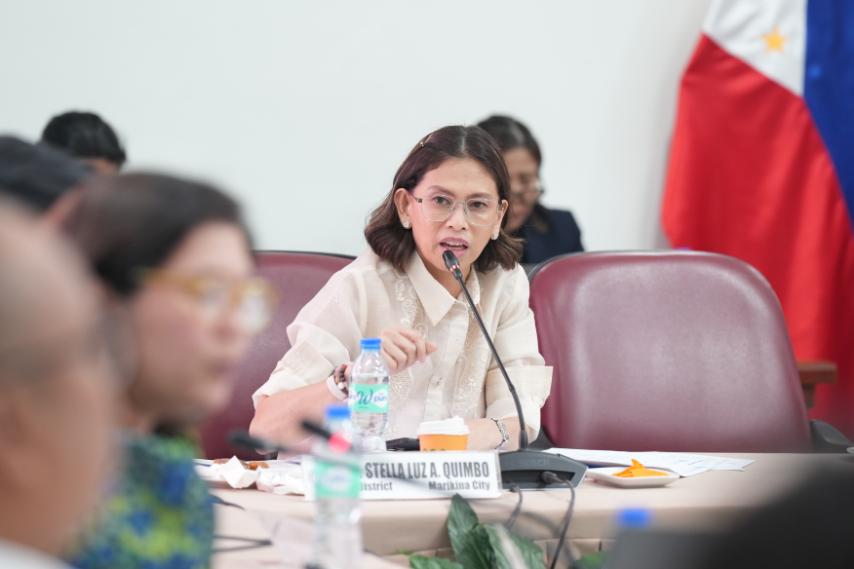'In the interest of time': Quimbo says urgency to pass budget spares corrected bicam report from Congress ratification
At A Glance
- Marikina City 2nd district Rep. Stella Quimbo has argued that the urgency to enact the national budget on time justifies not having lawmakers ratify corrections to the bicam report just before the budget measure gets signed by the President.
- Quimbo is the acting House Committee on Appropriations chairperson.
 Marikina City 2nd district Rep. Stella Quimbo (PPAB)
Marikina City 2nd district Rep. Stella Quimbo (PPAB)
The urgency to enact the national budget on time justifies not having lawmakers ratify corrections to the bicam report just before the budget measure gets signed by the President.
Marikina City 2nd district Rep. Stella Quimbo made this argument as she continued to defend the P6.352-trillion 2025 General Appropriations Act (GAA) from claims of irregularities, specifically the allegations on a "blank budget" or "blank appropriations".
Quimbo, the acting House Committee on Appropriations chairperson, noted that the consequence of not passing the national budget on time is having a reenacted budget. This is problematic, she said.
"Alam naman natin na kapag may reenacted budget tayo, magkakaroon tayo ng inhibited growth (We know that if we have a reenacted budget, we will have inhibited growth)," Quimbo told reporters.
She bared that since 2007, the approved annual bicam reports have come with two omnibous provisions, one of which expressly allows technical staff of the House of Representatives and the Senate to enter corrections to the document post-ratification.
The particular provision reads, "The Technical Staff of the House Committee on Appropriations and the Senate Committee on Finance are authorized to effect corrections of typographical, grammatical and printing errors, as well as necessary adjustments such as performance indicators and section number of general and special provisions as a consequence of the amendments."
Incidentally, the second provision says that, "In case of conflict between the [Bicameral] Conference Committee Report and the printed copy of the bill, the latter shall prevail."
The "printed copy" refers to the enrolled version of the General Appropriations Bill (GAB), which the President ultimately signs and enacts as the GAA--ideally before the turn of the year.
Congress carried out the deliberations on the 2025 GAB during the latter half of 2024.
The contention of 2025 budget critics is that the filling in of "blanks" in the bicam report is a big no-no, since the printed copy that contains the corrections or figures supplied to such blanks doesn't go through ratification anymore.
It is only the bicam report approved the House and Senate during the Bicameral Conference Committee hearings themselves that gets ratified separately by the two chambers. For the critics, the non-ratification contravenes Congress' responsibility to ensure transparency in the budget.
"Ito pong omnibus provision ay nadyan po since 2007. So I checked every single bicam until 2007. I don't know if nandyan before 2007...but up to 2007, nandoon po ang dalawang omnibus provisions na yan because it does happen (blanks in the budget). So yan po yung safeguards," said Quimbo.
(This omnibus provision has been there since 2007. So I checked every single bicam until 2007. I don't know if it existed before 2007...but up to 2007, the two omnibus provisions have been there because it does happen. So those are the safeguards.)
"Ang sinasabi naman po ng members is (What the members are saying is), once you correct there is no need for you to come back to us for another ratification," the veteran congresswoman said.
"Alam naman natin na importante yung interest of time eh. Kasi alam natin ma kapag we miss out on the deadline, which is the end of the year, magkakaroon po tayo ng reenacted budget, which is a big problem," she further said.
(We know that the interest of time is important. Because we know that once we miss out on the deadline, which is the end of the year, we will have a reenacted budget, which is a big problem.)
A reenacted budget is essentially the re-use of the previous year's outlay. Since GAAs usually climb in amount each year, a reenacted budget is viewed as disadvantageous.